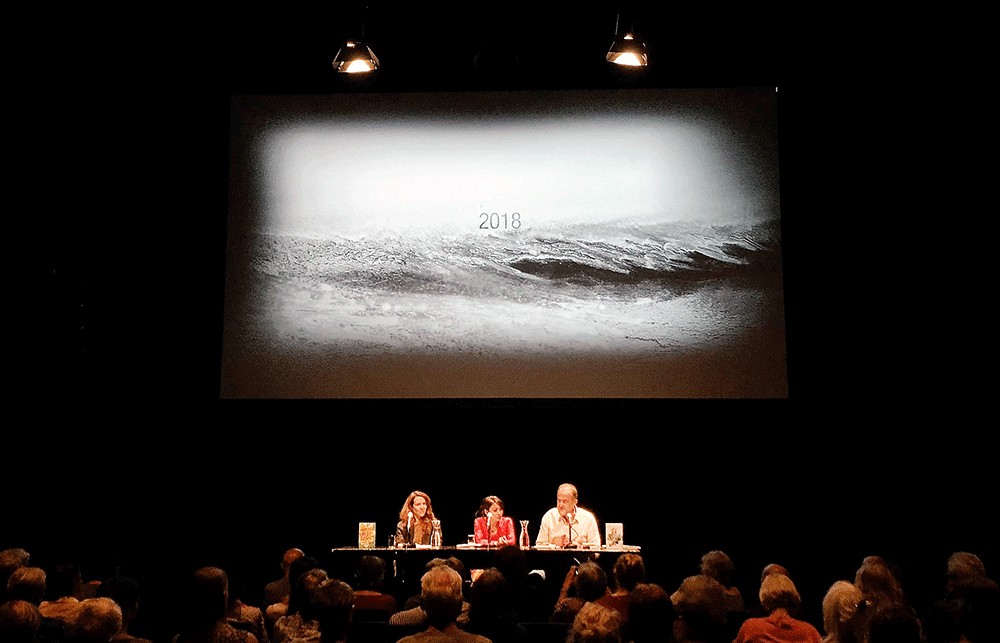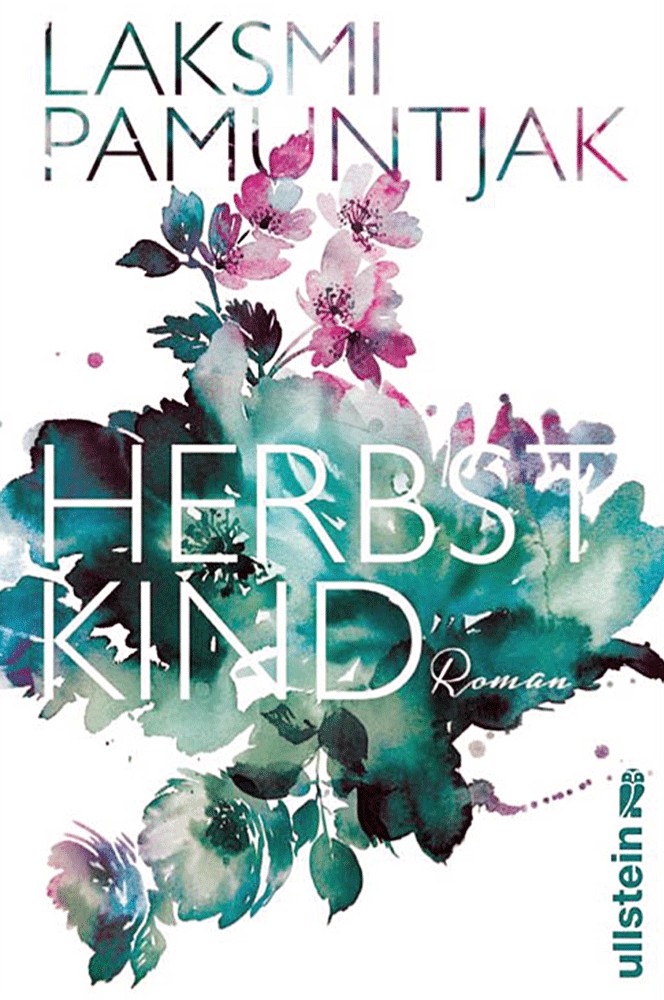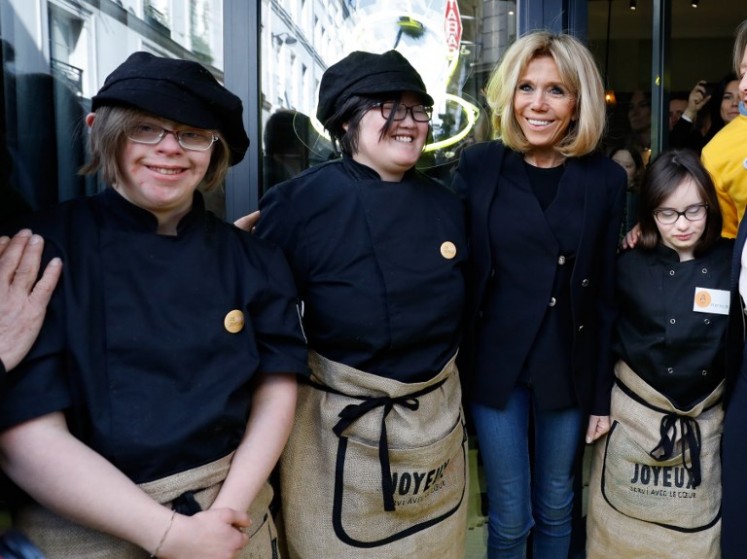Laksmi Pamuntjak: Shines through with 'Fall Baby'
Her new novel is released in German while the English and Indonesian versions are still being translated.
Change Size
 Book talk: Laksmi Pamuntjak (center) at the premiere reading of her new novel Fall Baby, or Herbstkind in German, at the International Literature Festival Berlin in Germany. (Courtesy of Laksmi Pamuntjak/-)
Book talk: Laksmi Pamuntjak (center) at the premiere reading of her new novel Fall Baby, or Herbstkind in German, at the International Literature Festival Berlin in Germany. (Courtesy of Laksmi Pamuntjak/-)
T
he audience listened attentively when Laksmi Pamuntjak, dressed in a traditional kebaya, began to read a passage of her new novel in her mother tongue, Indonesian.
Only a few among the people who had come to the premiere reading of Laksmi’s new novel Fall Baby could understand the words, but they seemed enthralled by her accentuation and the melodious sound of the Indonesian language.
This is a common sight at the International Literature Festival Berlin: authors of prose and poetry from all over the world, both renowned and up-and-coming, read in their original language before actors present the German translation. Every reading ends with a moderated discussion.
The German version of her book Fall Baby – Herbstkind in German – was released in August, while the English and Indonesian translations are still in progress.
This is certainly not the most conventional route, but according to Laksmi, it was due to practical considerations, as she wanted her German publisher Ullstein Verlag to quickly understand what Fall Baby was about, so she wrote the story in English, and Corinna Rodewald then provided the German translation.
“I am happy and content in both English and Indonesian and have been an avid reader in both languages since I was quite small,” Laksmi said when asked about the difficulty of having to switch between languages.
“I was taught to appreciate and be in love with both languages. I do dabble in different genres, and sometimes an idea comes to me in one language and I feel that I have to honor it. That is basically my governing principle. If a story presents itself to me in English, I would heed it as well.”
It was already the second time for Laksmi to be part of the festival, which ran from Sept. 5 to 15, during which Germany’s capital transforms into a platform for local and international literature. Three years ago, she presented her first novel Amba or The Question of Red on the same stage.
While the premiere reading of Fall Baby was the main event for Laksmi, she also took part in other programs of the festival, which celebrated its 18th edition this year.
In the “3x8 — Late Night Readings”, she joined two other authors — Karen Connelly from Canada and Antonio Ortuno from Mexico — giving eight-minute readings of their recent poems and stories in their own languages.
She also participated in the special section “The Art of Cooking”, dedicated to literature dealing with cooking and eating in both the scientific as well as political and cultural context, where she talked about her book Aruna dan Lidahnya or The Birdwoman’s Palate, which has been turned into a movie that will soon hit theaters.
It is perhaps not surprising at all that Fall Baby was first published in German, seeing that the city of Berlin plays quite a crucial role in the book.
Fall Baby is the sequel to Amba or The Question of Red — a love story set against the backdrop of culture, political turmoil and mythology.
While Amba is the protagonist in the first book, Fall Baby follows the story of Amba’s daughter Siri, an artist and “wanderer between worlds”. When Siri finds out the man she had always believed to be her father is, in fact, not her biological father, she packs her bags and moves to Germany. In Berlin, a city that connects her to both her fathers, she tries to recover her balance.

Like her main character Siri, Laksmi feels a deep connection to Berlin. In the book, Siri describes the city as both poison and cure.
“That’s what love is, isn’t it? You need it, you don’t need it, but you’d rather not be without it,” Laksmi explained, adding that this feeling could also be applied when talking about the love for a city.
“I wanted to pay tribute to my past that has always been very full of all things German,” she said.
“Berlin has always been very inspiring, in all the stories my father told me. When I first came here in 2015, I thought it was lovely that it lacked the hustle, vanity and attitude of many of the art capitals of the world. I found calm and measure in Berlin. People here value their privacy, which I don’t find in my neck of the woods. At the same time, it can be deceptive because it also insists on intellectual awareness and you are held to a very high standard.”
But the similarities between Laksmi and Siri — who is, of course, a fictional character, as the author adds with a laugh — don’t end there. Siri finds out about her true origins shortly before her 50th birthday. Laksmi had a similar experience.
“The notion of adoption and what it does to the adoptee, being internally as well as externally divided, and at the same time what it does to the parents who raised and sustained you and the ones who gave you life — why it is so important and why it was a story that I wanted to tell is because I was myself adopted and only knew about the truth of my origins when I was 23, on the eve of my wedding, and I was not told by my adoptive parents whose prerogative it was to tell me, but by my late husband,” Laksmi recalled. “Everybody knew — except for me.”
How did she react when she found out? Was she shocked, disappointed, furious? Did she feel betrayed?
“Yes, I did feel betrayed, maybe for five minutes,” Laksmi said jokingly. “After the initial shock, it made sense. I had always known that there was something else to my story, not of my own making. It was pre-knowledge, in a way. And yet, at the same time, I was filled with awe and magnified love for my parents, because it does call for tremendous generosity and sacrifice to decide to love and raise someone else as if she was your own child. I was filled with empathy but at the same time I didn’t know how to express it. It’s a lifelong struggle.”
While adoption is one of the central themes in Fall Baby, it also thoroughly discusses topics like art and politics.
“I grew up with paintings, as I did with books and music,” Laksmi said of her lifelong passion for art.
“Every painting reveals itself over time, and it takes on a story within you. I have had these long and close relationships with many paintings. I’m always at my calmest when I stand before a painting, so I have always wanted to write about it. I’m not an artist, but it’s the one thing that makes me happy and calm.”
The novel is set in both Berlin and Jakarta — this is where politics come into play. Fall Baby also introduces the character of Dara, a political activist from Indonesia.
“Dara is very much engaged in this battle against censorship by Islamists, which is of course fictional, but it is not something that you do not encounter in the Indonesia of today,” Laksmi explained.
“There is no such censorship in art, and yet you can find isolated incidents, in which anybody could storm into an exhibition and insist that it be banned on religious grounds. There is increased conservatism, and we have religious groups trying to impose or legalize a very singular view of life.”









